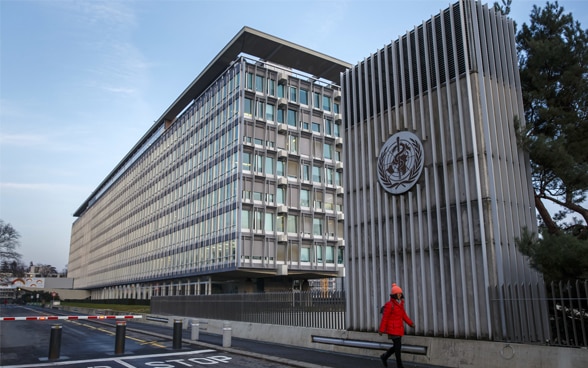Geneva: (digital) capital of health
The Geneva Health Forum 2020 took place online and focused on innovative global health solutions. It also highlighted the key role played by digitalisation, a topic of fundamental significance for Switzerland. The coronavirus pandemic has underlined the importance of taking a multilateral approach to the public health crisis; in this context, Geneva has consolidated its status as a hub of international and multidisciplinary collaboration.

In Zimbabwe, the SDC is supporting the UN's Safeguard Young People programme. It is linked to UNICEF's All In! platform, which unites various actors in the fight against adolescent AIDS. © UNICEF/All-in-Programme/2013
The coronavirus pandemic has made it vital to analyse data in real time, to provide information when and where it is needed, and to make carefully considered, coordinated decisions based on multidisciplinary expertise – including at the international level. The Geneva Health Forum, which took place on 16 to 18 November, reflected on digital governance, science diplomacy and new technology in the health sector and other areas. The Forum confirms the city's role as an international platform for exchange that pools expertise and encourages synergies between different fields.
A multilateral and multidisciplinary commitment to a global response
"I'm proud that Geneva is unanimously considered the world's health capital. As the headquarters of the World Health Organization, Geneva is home to a unique network of key players in the health sector." This is how Federal Councillor Ignazio Cassis began his speech at the Geneva Health Forum 2020. International Geneva is already well established as a point of reference for questions on human rights and humanitarian aid. But it is also home to various health organisations, and acts as a hub of expertise for digital solutions that strengthen healthcare systems.
As a result, the city is emerging as a 'digital residence' that incentivises coordinated, multilateral action to tackle global problems and crises. "A global crisis requires a global response," Cassis continued. "In confronting the crisis, we must think globally, act locally, and help one another in a spirit of solidarity." To that end, digital technology allows us to act in a coordinated and coherent manner at the international level. One need only think of traceability, which is so important in the current coronavirus crisis and only possible thanks to specially developed applications. It is also vital to be able to contact people straight away and share data that helps authorities make decisions. This is just one of many examples of how important digital technology is to Switzerland. Only a few days ago, in fact, the country adopted its Digital Foreign Policy Strategy for the period 2021–24. It constitutes a long-term approach that takes into account the UN's Sustainable Development Goals and also considers the field of health. "Digitalisation and new technologies provide an excellent opportunity to improve our healthcare systems and make them more financially sustainable," Cassis explained. In this context, Geneva is emerging as the perfect place to build a multilateral, multidisciplinary approach to solving problems that transcend international borders – a place that is home to key players in the fields of technology, digitalisation, health and humanitarian aid.
Digital solutions for health

Switzerland is one of the founding members of the WHO and provides it with financial support, currently with a particular emphasis on responding to the health crisis caused by COVID-19. Geneva is also the headquarters of the Global Fund to Fight AIDS, Tuberculosis and Malaria; Gavi, the Vaccine Alliance; and UNAIDS, all of which are also supported by Switzerland. The country's approach to the field of health strives to be consistent and sustainable, and involves more than just financial support. In fact, the key word here is innovation: the Global Programme Health Division at the Swiss Agency for Development and Cooperation (SDC) develops innovative solutions for global health issues affecting poor and vulnerable people in low-income countries. Digitalisation is also a priority of Switzerland's International Cooperation Strategy. Below, the deputy head of the SDC's Global Programme Health, Erika Placella, talks us through some initiatives that exploit the potential of digitalisation and aim to guarantee equal and universal access to high-quality healthcare services.
Building networks is important – and young people can help too
Building networks is important – and young people can help too
Putting young people at the centre of things allows us to harmonise measures, exploit potential, and mitigate risks. The SDC aims to move in this direction with its support of a joint The Lancet & Financial Times Commission entitled Growing up in a digital world: Governing health futures 2030. "We need stronger governance of digital technology, data and artificial intelligence in the field of health to exploit opportunities and mitigate risks in these areas," Erika Placella explains. "But the needs and opinions of young people have been neglected until now: that's why Switzerland is supporting this unique initiative to encourage the involvement of the younger generations, who will be the true protagonists of digital governance in the health sector over the coming years."
The Impact Hub Basel project also revolves around innovation and change, but instead focuses on the Sustainable Development Goals in low-income countries. "The initiative strives to exploit the potential of a network of on-the-ground start-ups aiming to improve healthcare management in these countries, and to bring them together with key operators in the healthcare sector and with financial investors," Placella says.
Network building is a fundamental concept for SDC projects in this field: the 'Health Network', for example, is a platform for exchange that encourages SDC staff, experts working on the ground, and external partners to share their knowledge. "The SDC is convinced that if the challenges and risks are managed effectively, and strong mechanisms for collaboration and governance are in place, innovation and new digital technologies will accelerate the pace of change, creating new opportunities for supporting healthcare systems in low-income countries and responding to complex and constantly evolving challenges," Erika Placella says.



